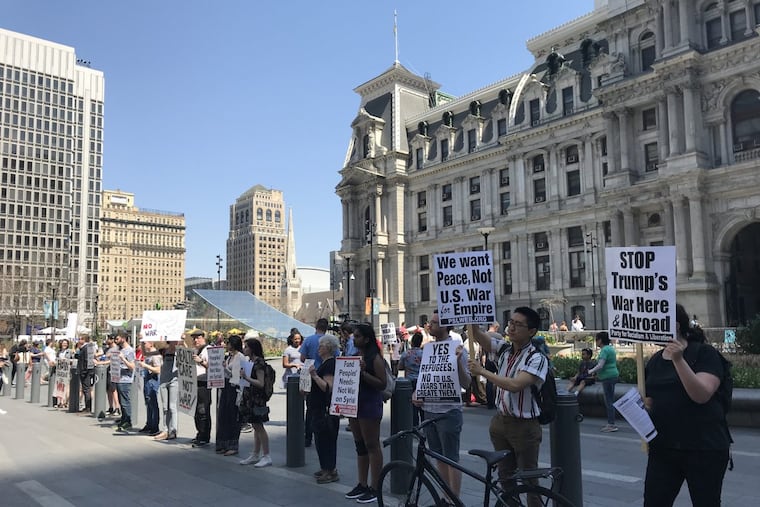Local protesters demonstrate against U.S. military strikes in Syria
The United States launched the air strikes along with two of its NATO allies, Britain and France. Protesters planned to walk from City Hall to Philadelphia's French and British honorary consulates, both located within blocks.

About 50 chanting, sign-carrying demonstrators lined the western edge of Dilworth Plaza outside Philadelphia City Hall on Saturday afternoon to protest the latest U.S. airstrikes in Syria.
President Trump announced the attacks late Friday as explosions were reported over Damascus, the Syrian capital. Trump said the action was in retaliation for a recent suspected chemical-weapons attack that killed civilians in a town controlled by rebels against the Syrian government of Bashar al-Assad and its Russian and Iranian allies. Trump blamed Assad for that attack, though some international observers have said it is hard to prove who was behind it.
>> READ MORE: I'll be traveling to Moscow as tensions with Russia over Syria heat up | Trudy Rubin
"It's short notice, but many people want to show they are against this war," said Scott Williams, a Philadelphia schoolteacher who helped organize the protest Saturday as a leader of the Workers World Party. He said other "left-wing" and pro-Arab groups asked members to express their opposition, as they have against previous U.S. attacks in Syria and other countries.
Friday's strike was Trump's second ordered attack in Syria. The first was last April, when he authorized Tomahawk cruise missiles to strike a Syrian airfield following Assad's use of sarin gas on civilians.
Williams said Trump's recent appointment of John Bolton as national security adviser underscored Trump's similarity to mainstream politicians and those sectors of the business community that benefit from war. Bolton has often justified U.S. military involvement in distant countries. Williams added that the money spent on Tomahawk missiles would be better spent on meeting social needs at home.
>> READ MORE: After Syria attack, US and Russia tensions rise, but military confrontation fears ease
The United States launched the military strikes along with two of its NATO allies, Britain and France. The protesters planned to walk from City Hall to Philadelphia's French and British honorary consulates nearby.
Saturday's protests are expected to be followed by other demonstrations.
"We are going to be part of a number of protests coming up," said Aram Bowen, an organizer of the Philadelphia Rojava Solidarity Network, which sympathizes with the independent administration that governs much of northwest Syria, led by members of that country's Kurdish minority.
"Last night's strike on Syria could have endangered civilians, causing more suffering to the people of Syria," Bowen said in an interview via Facebook.
Syria's people face many threats, Bowen added. While American special forces have fought alongside the Kurds in driving the ISIS terrorist militia out of Syria's northern provinces, Bowen said the Kurds have in recent months themselves been attacked by soldiers and militias backed by Turkey, another NATO ally. The Turkish government says the Kurds in Syria are allied with groups it calls terrorists in Turkey.
Bowen called Rojava, the Kurds' name for the part of Syria they control, "a peaceful and democratic community" where Muslim sects, Christians, and members of other Syrian groups have sought refuge from warfare between Assad's allies and Islamist rebels. He called on the United States to pressure Turkey to end its military expeditions in Syria.